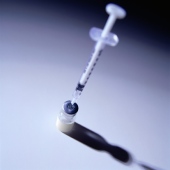- Could Your Grocery Store Meat Be Causing Recurring UTIs?
- Are You Making This Expensive Thermostat Error This Winter?
- Recognizing the Signs of Hypothyroidism
- 10 Strategies to Overcome Insomnia
- Could Artificial Sweeteners Be Aging the Brain Faster?
- Techniques for Soothing Your Nervous System
- Does the Water in Your House Smell Funny? Here’s Why
- Can a Daily Dose of Apple Cider Vinegar Actually Aid Weight Loss?
- 6 Health Beverages That Can Actually Spike Your Blood Sugar
- Treatment Options for Social Anxiety Disorder
FDA Approves Another Weekly Injectable Drug for Type 2 Diabetes


The U.S. Food and Drug Administration approved a new type 2 diabetes drug, Trulicity, on Thursday. Trulicity is part of a class of once-a-week injectable drugs that help manage blood sugar levels in adults with type 2 diabetes.
“Trulicity is a new treatment option, which can be used alone or added to existing treatment regimens to control blood sugar levels in the overall management of type 2 diabetes,” Dr. Mary Parks, deputy director of the FDA’s Office of Drug Evaluation II, said in an agency news release.
About 26 million Americans have type 2 diabetes. More than 90 percent of all diabetes cases are type 2 diabetes, according to the FDA. The disease causes high blood sugar levels, which can lead to serious complications including heart disease, vision problems and nerve and kidney damage.
Trulicity (generic name dulaglutide) is a type of drug called a glucagon-like peptide-1 (GLP-1) receptor agonist. These drugs help to lower blood sugar levels, according to the FDA.
Before approving the drug, the FDA evaluated six clinical trials that included nearly 3,500 people with type 2 diabetes. The drug was studied alone and in combination with other types of diabetes medications, including metformin, mealtime insulin injections and others.
Those taking weekly Trulicity injections had improvements in their long-term blood sugar levels, the FDA said.
The most common side effects were nausea and vomiting, diarrhea, abdominal pain and a decreased appetite, according to the FDA.
The drug will carry a boxed warning stating that the use of some GLP-1 receptor agonists has been associated with thyroid tumors in rodents. The FDA said Trulicity should not be prescribed for patients with a personal or family history of a type of thyroid cancer called medullary thyroid carcinoma, or for patients with multiple endocrine neoplasia syndrome type 2. People with this disease have tumors in more than one gland in their body and are at increased risk for medullary thyroid carcinoma.
The drug, made by Eli Lilly and Company, is not intended for use in people with type 1 diabetes, people with severe stomach or intestinal problems, or as the first drug treatment for someone with type 2 diabetes, the FDA said.
The FDA said it will require the drug’s manufacturer to conduct a number of studies after the drug approval (called post-marketing studies), including a study to evaluate cardiovascular issues for people who have a higher risk of heart problems, the news release said.
More information
Learn more about type 2 diabetes from the American Diabetes Association.
Source: HealthDay
Copyright © 2026 HealthDay. All rights reserved.










